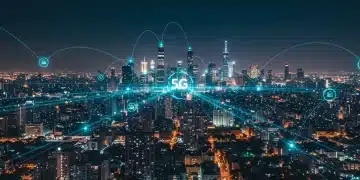Apps: How Applications Are Shaping Our Digital Future
The App Revolution
![]()
In today’s hyperconnected society, apps are no longer optional — they have become essential companions in our daily routines. From managing finances, learning new skills, to ordering food or streaming entertainment, apps have redefined not only how we live but also how we interact with technology and the world around us.
The real turning point came in 2008 with the launch of Apple’s App Store, followed shortly after by Google Play. These platforms democratized software distribution and created an entirely new digital economy. Suddenly, anyone with a smartphone had instant access to tools, games, and services at their fingertips. This moment triggered an explosion of digital solutions, and today there are over 5 million apps available worldwide, covering almost every imaginable need.
What began as simple tools — like calculators, calendars, or note-taking programs — has now evolved into powerful ecosystems. Apps no longer serve a single function; they are interconnected platforms that drive communication, business, education, and even healthcare. Messaging apps such as WhatsApp and WeChat have replaced traditional SMS, while financial apps like PayPal, Venmo, and Nubank are reshaping the way people manage and transfer money. In healthcare, apps now allow patients to schedule appointments, track vital signs, or even consult doctors virtually.
The app revolution has also empowered entrepreneurship. Developers and startups gained access to a global market, sparking innovation in every industry. Social media apps transformed how we build communities, fitness apps have motivated millions toward healthier lifestyles, and e-learning platforms are making knowledge more accessible than ever.
🌍 The Global App Economy
The app economy has emerged as one of the most powerful and transformative industries of the digital age, reshaping the way individuals, businesses, and governments operate. More than just a trend, it has become a driving force of the global digital transformation, influencing everything from consumer behavior to corporate strategy.
What started as a niche market of small mobile tools has turned into a multi-billion-dollar industry that touches nearly every aspect of modern life. Today, apps are no longer just optional add-ons for entertainment or productivity—they have evolved into essential platforms at the heart of commerce, communication, healthcare, education, and financial services.
💰 Economic Power and Global Reach
The scale of the app economy is staggering. Reports predict that by 2025, global revenue from apps will surpass $600 billion, fueled by the rise of mobile-first societies, cloud computing, and digital ecosystems.
-
Consumer impact: Apps drive e-commerce growth, with platforms like Amazon, Alibaba, and Mercado Livre relying heavily on their mobile interfaces to dominate markets.
-
Business transformation: Companies use apps to deliver customer service, manage logistics, and engage in real-time communication with clients.
-
Regional growth: While North America and Europe remain strong markets, the real surge comes from emerging economies such as India, Brazil, and parts of Africa, where smartphones are the primary gateway to the internet.
🏦 Shaping Business Models
![]()
The app economy has redefined how businesses generate revenue. It gave rise to entirely new monetization models that today dominate the digital landscape:
-
Freemium apps like Spotify or Evernote, which attract users with free versions while offering premium upgrades.
-
Subscription-based apps such as Netflix, Calm, or Adobe Creative Cloud, building predictable, long-term customer relationships.
-
In-app purchases, especially in gaming apps like Candy Crush or Fortnite, which allow users to enhance their experience with microtransactions.
-
Advertising-based apps like TikTok, Instagram, and YouTube, which monetize massive audiences through targeted ads.
These models not only generate profit but also encourage continuous innovation, pushing developers to improve user experiences and engagement.
🌐 The Social Impact of Apps
Beyond their economic power, apps have fundamentally transformed the way society functions, influencing how people communicate, work, learn, and even take care of their health. They are no longer just digital tools but drivers of cultural, social, and behavioral change.
📞 Communication: Connecting the World in Real Time
Messaging apps such as WhatsApp, Telegram, and WeChat have almost completely replaced traditional SMS and international calling. With a single tap, people can send instant messages, voice notes, photos, or videos across the globe—often for free.
-
Globalization of relationships: Families separated by distance stay connected through video calls and group chats.
-
Social movements: Apps have become powerful platforms for activism and community building, allowing people to organize protests, share information, and mobilize support.
-
Business communication: Companies now use messaging apps as official channels for customer service and internal collaboration.
🏥 Healthcare: Medicine in the Palm of Your Hand
Healthcare apps are revolutionizing how patients and doctors interact. Instead of waiting weeks for an appointment, patients can now consult physicians through telemedicine platforms in minutes.
-
Telemedicine: Apps like Teladoc and Doctoralia allow real-time video consultations, prescription management, and health monitoring.
-
Wellness and fitness: Apps such as MyFitnessPal, Headspace, and Calm help users track calories, improve sleep, reduce stress, and maintain healthier routines.
-
Preventive healthcare: Wearable devices linked to health apps can detect irregular heartbeats or monitor blood pressure, potentially saving lives.
🎓 Education: Democratizing Knowledge
Apps have broken down barriers to education, making learning accessible to anyone with a smartphone and an internet connection.
-
Language learning: Platforms like Duolingo gamify education, enabling millions to learn new languages in fun and interactive ways.
-
E-learning platforms: Apps such as Coursera, Udemy, and Khan Academy provide affordable access to courses once limited to universities.
-
Lifelong learning: Adults can retrain for new careers, while students in developing countries gain opportunities previously out of reach.
This democratization of education is one of the most profound impacts of the app revolution, reducing inequalities and opening new doors worldwide.
💳 Finance: Empowering Financial Independence
Digital banking and fintech apps are reshaping how people handle money. Instead of long bank queues, users can now open accounts, transfer funds, or invest—all from their smartphones.
-
Neobanks: Apps like Nubank and Revolut challenge traditional banking by offering fee-free accounts, instant transfers, and intuitive interfaces.
-
Payments: Apps such as PayPal, Venmo, and Cash App have made digital transactions quick, secure, and borderless.
-
Financial literacy: Budgeting apps empower users to save money, reduce debt, and improve their financial health.
This digital revolution is especially powerful in regions where traditional banking infrastructure is limited, giving millions access to financial systems for the first time.
🌟 A New Social Infrastructure
In just over a decade, apps have become the backbone of modern society. They connect people, empower communities, improve healthcare access, democratize knowledge, and enable financial inclusion.
The social impact of apps is clear: they don’t just change how we live—they redefine what’s possible
🚀 The Future of the App Economy
As technology continues to advance, the app economy is expected to become even more influential. Emerging trends include:
-
Artificial intelligence: AI-powered apps capable of predicting user needs and automating tasks.
-
Superapps: all-in-one platforms that combine shopping, payments, transport, and communication.
-
Blockchain integration: decentralized apps (dApps) that provide secure, transparent financial transactions.
-
Sustainability-driven apps: digital platforms that encourage eco-friendly habits and reduce carbon footprints.
In short, the app economy is no longer a support industry—it is the backbone of the digital age, shaping innovation, generating jobs, and creating new opportunities for startups, tech giants, and independent developers alike.
💰 A Multi-Billion-Dollar Industry
The global app economy generates hundreds of billions of dollars annually, and this number continues to grow year after year. According to recent reports, revenue from apps is projected to surpass $600 billion by 2025, fueled by both consumer spending and business adoption.
-
User engagement: On average, people spend 4–5 hours per day on mobile apps, making them one of the most influential digital touchpoints.
-
Regional growth: Emerging markets such as India, Brazil, and Africa are seeing explosive growth in app usage thanks to affordable smartphones and wider internet access.
-
Business adoption: Companies across all industries—from healthcare to finance—are building apps to connect directly with customers and streamline operations.
🏦 Key Business Models of the App Economy

The success of the app economy comes from diverse and flexible monetization strategies. The most common business models include:
🔓 1. Freemium
Apps are free to download but offer premium features or upgrades at a cost.
-
Examples: Spotify, Evernote.
-
Why it works: Users try before they buy, increasing trust and adoption.
🔄 2. Subscriptions
Recurring monthly or yearly payments give access to ongoing services or exclusive content.
-
Examples: Netflix, Headspace, Adobe Creative Cloud.
-
Why it works: Predictable revenue streams and strong customer retention.
🛒 3. In-App Purchases
Users pay to unlock features, buy digital goods, or enhance their experience.
-
Examples: Mobile games like Candy Crush or Clash of Clans.
-
Why it works: Microtransactions make spending easy and scalable.
📢 4. Advertising-Based Apps
Revenue is generated by displaying ads inside the app.
-
Examples: Free news apps, TikTok, Instagram.
-
Why it works: Monetizes massive user bases without charging upfront fees.
🌟 Why the App Economy Matters
The app economy is more than just money—it’s about opportunities, innovation, and impact:
-
For startups: Apps provide a low-cost entry point to global markets, enabling entrepreneurs to compete with industry giants.
-
For tech giants: Companies like Apple, Google, and Meta dominate ecosystems, shaping how billions of people interact with digital products.
-
For independent developers: The app stores empower freelancers and small teams to reach international audiences.
-
For users: Apps make life easier, faster, and more connected, creating a digital lifestyle that blends convenience with efficiency.
📈 The Future of the App Economy
The next phase of the app economy will be shaped by emerging technologies and shifting consumer behaviors:
-
AI-powered apps will enhance personalization and automation.
-
Superapps will consolidate multiple services into a single platform.
-
Blockchain apps could transform finance with decentralized solutions.
-
Sustainable apps will respond to the global demand for eco-friendly digital practices.
As apps continue to grow in both revenue and influence, they are set to remain the backbone of the digital economy—driving innovation for startups, empowering developers, and connecting billions of users worldwide.
🗂️ The Top Categories of Apps
Apps can be grouped into core categories that dominate daily usage:
| Category | Examples | Why They Matter |
|---|---|---|
| Productivity | Notion, Trello, Todoist | Help users organize tasks, projects, and daily schedules |
| Personal Finance | Mint, Mobills, YNAB | Track expenses, budget planning, saving strategies |
| Health & Wellness | Headspace, Calm, MyFitnessPal | Promote mental health, sleep quality, fitness, and nutrition |
| Education | Duolingo, Coursera, Khan Academy | Provide language learning and access to online courses |
| Entertainment | Netflix, Spotify, TikTok | Streaming music, videos, movies, and social media content |
📈 The Evolution of Apps
The evolution of apps can be seen in three waves:
-
First generation (2008–2010): simple utilities such as calculators and note apps.
-
Second generation (2010–2020): the rise of social media, ride-hailing (Uber), and streaming apps.
-
Third generation (2020–present): the rise of AI-driven apps, augmented reality (AR), and wearable integrations.
🌟 Why Apps Matter in Daily Life
-
Convenience: tasks that once took hours now take seconds.
-
Accessibility: services are available to anyone with a smartphone.
-
Personalization: apps analyze behavior to deliver custom content.
-
Education & inclusion: knowledge is democratized through apps.
-
Financial control: personal finance apps help users save money.
⚠️ Challenges of the App World
While apps have clear benefits, challenges remain:
-
Screen addiction: overuse can harm mental health.
-
Data privacy: sensitive information is often collected.
-
Overwhelming choices: millions of apps make decision-making harder.
-
Cybersecurity risks: fake or malicious apps can lead to scams.
🚀 Future of Apps:

The future of apps is evolving at lightning speed. What started as simple tools for entertainment or communication has now become a powerful ecosystem that connects nearly every aspect of our daily lives. Looking ahead, the next generation of apps promises even deeper integration, personalization, and innovation. Here are the top trends shaping the future of apps in 2025 and beyond:
📲 1. Superapps: One App, Endless Possibilities
Superapps are set to dominate the global app economy. Instead of downloading dozens of different apps, users can rely on one platform that integrates multiple services. Imagine managing payments, shopping, messaging, and even healthcare from a single app.
-
Example: In Asia, WeChat and Grab have already proven the potential of superapps, offering banking, ride-hailing, and communication in one place. In 2025, similar platforms are expected to expand globally.
-
Why it matters: Superapps save time, reduce digital clutter, and provide a smoother user experience.
🤖 2. AI-Powered Apps: Smarter Than Ever
Artificial Intelligence is transforming apps into proactive digital assistants that can predict and meet user needs before you even ask.
-
Example: Fitness apps may recommend workouts based on your mood and energy levels, while finance apps could automatically suggest saving strategies when spending habits change.
-
Why it matters: These AI-powered apps create highly personalized experiences, helping users be more productive, healthier, and financially aware.
🕶️ 3. AR and VR Integration: Beyond Entertainment
Augmented Reality (AR) and Virtual Reality (VR) are expanding far beyond gaming. The next wave of apps will transform how we shop, travel, and learn.
-
Tourism: AR apps can overlay historical information when you visit landmarks.
-
Education: VR apps allow students to explore 3D classrooms, museums, or even outer space.
-
Retail: Furniture apps like IKEA Place already let you preview items in your home before buying.
-
Why it matters: AR and VR create immersive, interactive experiences that bridge the gap between the digital and physical worlds.
“From managing finances, learning new skills, to ordering food or entertainment, apps have redefined how we live and interact with technology.”
👉 Link sugerido: Apps to Organize Your Daily Routine
⌚ 4. Wearables & Smart Homes: A Connected Lifestyle
As smart devices become more common, apps will play a central role in creating seamless digital ecosystems.
-
Example: A health app linked to your smartwatch can track heart rate, send alerts, and even sync with your doctor. Meanwhile, smart home apps will control lighting, security, and appliances with a single tap or voice command.
-
Why it matters: The integration of apps with wearables and IoT devices will redefine convenience, efficiency, and even personal safety.
🌱 5. Sustainable Apps: A Greener Digital Future
In a world increasingly focused on sustainability, apps are playing their part by encouraging eco-friendly habits and reducing digital waste.
-
Example: Apps that promote ride-sharing, track carbon footprints, or recommend sustainable shopping options are becoming more popular.
-
Why it matters: Sustainable apps not only help the planet but also align with consumer demand for more ethical and responsible technology.
🔮 What This Means for Users and Businesses
![]()
For users, the future of apps means more convenience, personalization, and smarter ways to manage daily life. For businesses and developers, it opens opportunities to build apps that are integrated, intelligent, and sustainable.
One thing is certain: apps in 2025 and beyond will no longer just support our lives — they will actively shape them.
✅ How to Choose the Best Apps in 2025
With millions of options available in the app stores, choosing the right apps in 2025 can feel overwhelming. The key is to focus on your personal goals and evaluate which apps truly add value to your daily life. Here are some essential tips to help you make smart choices:
🎯 1. Define Your Goal Before Downloading
Before you start browsing the app store, be clear about what you need. Are you looking for productivity apps to organize your work, health apps to track fitness, entertainment apps for streaming, or finance apps to manage your money?
-
Example: If your goal is to improve time management, an app like Todoist or Notion might be the best fit. For saving money, apps like Mint or Mobills can help you stay on budget.
⭐ 2. Check Reviews and Ratings
User reviews are one of the most reliable ways to gauge the quality of apps. Look beyond the star rating and read actual feedback to understand common strengths and weaknesses.
-
Positive reviews highlight real benefits, while critical reviews reveal potential problems such as frequent crashes, hidden fees, or poor customer support.
🔒 3. Prioritize Security and Privacy
With so many apps collecting personal data, protecting your privacy should be a top priority. Before downloading, check the app’s permissions, privacy policy, and whether it offers data encryption.
-
Pro tip: Choose apps with a solid reputation and avoid those that ask for unnecessary access to your contacts, microphone, or location.
🆓 4. Test Free Trials First
Many premium apps now offer free trials, allowing you to explore features before committing to a paid plan. Take advantage of this option to ensure the app meets your needs.
-
Example: Streaming apps often provide 7–30 day free trials, while productivity apps like Notion or Evernote let you try their advanced features before upgrading.
🗑️ 5. Avoid App Clutter
It’s tempting to download dozens of apps, but too many can overwhelm your device and reduce productivity. Instead, focus on apps that you actually use regularly.
-
Review your phone every few months and delete apps that no longer serve a purpose.
📌 Final Thoughts
The world of apps has revolutionized daily life. What started as small digital helpers has become the core of modern living — shaping communication, education, health, and the global economy.
As we move forward, the app economy will only expand, bringing innovations like superapps and AI-driven platforms. Keeping up with these top app trends ensures you stay ahead in a digital-first world.





